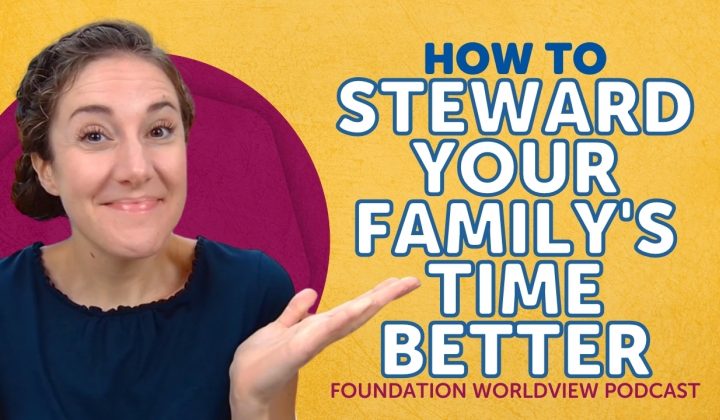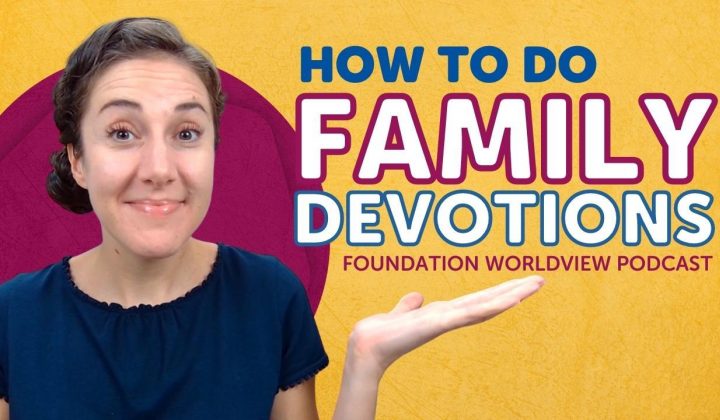Learn more about the journey that led to us equipping kids to carefully evaluate every idea they encounter.
Meet members of our team who have contributed to curriculum development.
Hear from real users of the Foundation Curriculum.
Learn what we believe about God, Jesus, Scripture, and more.
Preparing Kids on How to Deal with a Bully
Today's question says, "Our daughter, in seventh grade, is going to public school for the first time. Aside from the idea that 'hurting people, hurt people', how do we teach her to handle being bullied? She's a sensitive child and we remind her of her value and beauty in God's eyes. I just want to be ahead of this type of situation."
Transcript
Note: The following is an auto-transcript of the podcast recording.
Hello friends, and welcome to another episode of the Foundation Worldview Podcast where we seek to answer your questions so that you can equip the children that God has placed in your care to carefully evaluate every idea they encounter and understand the truth of the biblical worldview. I'm your host, Elizabeth Urbanowicz, and I'm thrilled that you've joined me for another episode today. Today's question says, "Our daughter, in seventh grade, is going to public school for the first time. Aside from the idea that 'hurting people, hurt people', how do we teach her to handle being bullied? She's a sensitive child and we remind her of her value and beauty in God's eyes. I just want to be ahead of this type of situation." Now, for those of you who are watching and listening, you may have just felt your stomach drop when you heard me read that question because I don't know if middle school brings back wonderful memories for anyone, but I think this is an important question to think through. So that's the question we're going to dive down deep into today.
Before we do, if you have found the content of this podcast beneficial, please make sure to like and subscribe so that you don't miss any future episodes, and also ask that you would invest the time writing a review because that helps more people discover this content, and we want as many adults as possible to be equipped to get the kids in their care thinking critically and biblically. Also, if you have a question you would like for me to answer on a future Foundation Worldview podcast, you can submit it by going to FoundationWorldview.com/podcast.
Now, I really appreciate this question and I really appreciate how this parent is thinking proactively that they haven't yet encountered any situations of bullying or hardship at the middle school, but they're thinking, okay, what can we do to prepare our daughter for this? And I think that is always a wise approach. We always want to be as much as we can proactive in our parenting rather than reactive.
Now, I am going to give some practical tips for what the question that was asked, however, I need to be honest just up at the front end to whoever wrote in this question that unless this situation is something where you feel very confident that God is specifically leading you to send your daughter into public school, I would just recommend avoiding public middle school. I mean, I do frequently recommend just avoiding public school in general. I do know that there can be situations where God can specifically lead families into that, but especially if you're thinking about putting your child in middle school, I would recommend waiting if you're going to put her in public school to wait until high school.
Middle school, as we all know, is a really difficult time just as bodies are changing, hormones are changing, attitudes are changing, and it's a really, really difficult time, especially with all people who are the same age, just put in one building.
Recently, actually, one of the elders at my church, I was chatting with him before a corporate worship service one Sunday, and he was telling me that he had just applied to start substitute teaching in one of the school districts near us, and he was telling me about it, and then he was like, "well, you were a teacher. What do you think?" And I was like, "I would really just encourage you to have very low expectations for what this is going to be like because substitute teaching is really difficult, especially at the middle school level." And so a few weeks later, he and I were chatting again and I was like, "how's the substitute teaching going?" And he was like, "Elizabeth, there is something very unnatural about having that many children all the same age in one classroom together." And I just kind of laughed, but it's true.
There is something very unnatural about having all people of any one age just together in the same spot. And our public school system, it really stems back that it started in the mid to late 18 hundreds and it was based off of the work of a man named Horace Mann and then later John Dewey. And these men had really, really good intentions, but their desire was to turn our society into a humanist society. And the only way to be able to actually break down the worldview ties of the children that were developed in the home was really to separate the children from their parents and from their siblings. And so grade level classes were born, which grade level classes helped the teacher just focus on one grade level, but it also separated siblings so that the humanist worldview could be imposed on the children. And now we just kind of buy into this model of dividing children according to grade level without any thought or without any question, and especially in middle school, by just taking students that are anywhere from fifth grade to eighth grade and putting them in an isolated building is just a terrible idea because they don't have any students that are younger than them who are looking up to them, and they don't have any students that are older than them kind of keeping them in line. So just having this conglomerate of children somewhere between the ages of 10 and 13, all pulled together in one location really is just a terrible idea.
And then especially just putting all children who are dealing with different things together and then with where our culture is going and all of the things that are shoved at them, it's just middle school today is probably 10 times harder than it was back in the eighties, nineties and early two thousands, just with all that is going on.
So for those of you watching and listening, and then for whoever wrote this question, and I would really recommend if you can avoid public middle school, I would highly encourage you to do that. Now, you might feel like your situation is very limited. I don't know if this is a single parent situation or a situation of financial hardship, but just a few things to consider, research what scholarships are available for private schools, not only from the school themselves, but just from other wealthy donors in the area. Because there are people who are very generous, who love Christian education and who are willing to give generously. Be honest with the elders at your church and see if there's any help that can come from there. Also, you can consider homeschooling on your own or you can consider homeschooling with a different family. You can consider going to a university model school where the kids are at school two to three days a week, and then they're at home the other two to three days.
And then just pray. Pray asks for God to give you wisdom and don't underestimate what he can provide because God owns the cattle on a thousand hills. God owns the universe. So providing $10-$15,000 for private school tuition is very much within the scope of what God can do. So that would just be my first encouragement that I can't in good conscience recommend sending a child to a public middle school, especially if it's their first public school experience.
But if that is what is happening, I can give some tips on how to help in this situation. So how do we prepare our children for bullying that is more than likely bound to come when sinful people of all the same age and stage are put together for eight hours a day? Or how do we just train our children to deal with people who are unkind because we're sinners and sinners sin?
So I think that we can train them to do several things. So the first thing I think that we can train them to do is to recognize the message when somebody's bullying them, when someone's saying something to them, recognize the message and ask, okay, what is the truth? So when somebody says something about me, what is the truth? If somebody makes fun of an appearance or makes fun of an ability, what is the truth? The truth is that I am created in God's image that God loves me so much, he sent Jesus to die for me so that I could be reconciled to him. Nothing can separate me from the love of God, and my hope is in him. So we want to just make sure we're arming our kids with the truth so that first they recognize the message and then ask what is the truth?
And we need to make sure we're arming them with the Scripture that they need to understand what the truth is. Now I can look back on it and smile, but at the time it was not very funny. I did grow up going to public school, and when I was in public elementary school, it was just a neighborhood elementary school. And then when I went to middle school, all four of the elementary schools in our city were brought together. And it was a very, very different experience for me because most of the children in my neighborhood elementary school, they came from homes where most of them were two parent homes. Both parents were in the home and were actively involved, where most of our city was actually an urban area, lots of Section eight housing, and most of the children that were in those other schools didn't have a dad that was actively involved in their life. And so there was lots of problems there.
So middle school for me was just like a nightmare. I don't think I would ever want to go back to middle, well I know I would never want to go back to middle school, but when I entered middle school, I wasn't super self-conscious. I didn't think a lot about my looks. My parents didn't even have a mirror in my bedroom. And I remember one day walking down the hallway in middle school and this one girl walked past me and she just stopped. And she looked at me and she said a swear word. And then after that she was like, you are so ugly. And I remember thinking what? It had never occurred to me before to even think about my looks and whether I was good looking or bad looking, but that just stuck with me. And I didn't at that time have the tools to just say, okay, what did she just say? What is the truth? I just kind of internalized that and I just assumed, oh, everybody just must think that I am ugly. And I mean we all to a certain extent just have difficulty with our looks and our appearance because of the culture that we live in, because we live in a fallen world. But I didn't have that skillset to be able to ask, okay, what is the truth here? To remind myself of the truth? And that was just a lie that I believed for so many years. So we want to make sure that we're equipping our kids to recognize the message and ask what is the truth?
The second thing that we need to do is we need to help them plan a next step. So when someone makes fun of you or someone is bullying you in another way, what are you going to do? Is the next step, the appropriate step to walk away? Is the next appropriate step to find an adult that you can tell? So just talk through a game plan. If somebody is making fun of you, if someone is intimidating you, if a group of kids are ganging up on you, what is the right next step? Because as this person who wrote in this question said, they want to be proactive, and so we don't want to wait until our child is in this situation to then give them a game plan. We want to have the game plan ahead of time. And so what is the next step? Maybe walking away, finding an adult.
Then the third step, once your child is in a safe place, once they're no longer being bullied once, they're no longer in that situation, the next really important thing to do is to train them to pray for that person because that person is not reconciled in their relationship to God. And we don't know why they're choosing to bully or to make fun or whatever they're choosing to do. But we want to actually be obedient to Jesus's command, to pray, to love our enemies and pray for those who persecute us. And so that's something that's important. And when our child comes home from school and tells us about a situation like this, this is something we can even do with them. "Okay, what is this child's name? Or what is this? Are the names of the children in this group? Okay, let's pray for them. Let's pray that God would convict them of their sin, that they would feel the weight of their sin, and that they would come to know that the only solution for that sin is in Jesus."
This is something, not that I'm bullied nowadays, but sometimes having a public ministry that's on YouTube, we get some really interesting comments on YouTube or on social media and just get accused of all sorts of crazy things. And that's what I've trained myself to have as my first response. Me just hearing, reading a comment on YouTube is very different than a child being physically present with someone in a middle school, but that's what I do. Whenever somebody just makes just crazy a claim about me or what I'm teaching is my first reaction is to just stop and just to pray for that person. Say, "God, I don't know who this person is, but obviously they're very angry towards you and towards me because I love you and I don't know what has caused this, but you do. Please let this person come to know how much you love them. Let them feel the weight of their sin and repent of that sin and be reconciled to you that they may one day be my brother or sister in eternity."
And then the fourth thing that I would encourage you to train your child to do is bullying can be a really intimidating situation. And so it can be really scary then to go back to school the next day. And so a really important thing to do is encourage them to identify who they can reach out to to encourage, so to take their eyes off of themselves. So rather than focusing on, when am I going to see this person again? What are they going to say to me? Is there going to be a group of kids that gangs up on me to focus on, okay, who else, who's in my class or my grade or just in the school hallway has a locker in your mind that might need encouragement? Who can I reach out and encourage? Because that will help our children take their eyes off of themselves and actually look out and to be the hands and feet of Jesus where they are.
So again, those four things that I recommended were, one, recognize the message and ask, what is the truth? Number two, help them plan next steps. Number three, pray for the person or the people who are doing the bullying. And then four, identify who your child can reach out to encourage at school.
Well, that's a wrap for this episode. I hope that what we've talked to has been beneficial for you as you continue to faithfully disciple the children that God has placed in your care. My prayer for you as always is that as we leave this time together, no matter the situation you and the children God has placed in your care, find yourselves that you would trust that God is working all things together for your good by using all things to conform you more into the image of His Son. I'll see you next time!
Related Posts and insights

Stewarding Your Family's Time Better
Join Elizabeth Urbanowicz as we consider today's question, "how do we as parents navigates sports, hobbies, etc, to steward our family's time better?"

How To Do Family Devotions
Elizabeth Urbanowicz shares her experience growing up with family devotions and provides ideas on how to start and lead family devotions.

Which Bible Version is Easier for Kids to Understand?
Figuring out the best Bible translation for kids is an important question to consider. But is it best to use children’s bibles, picture books, etc?





